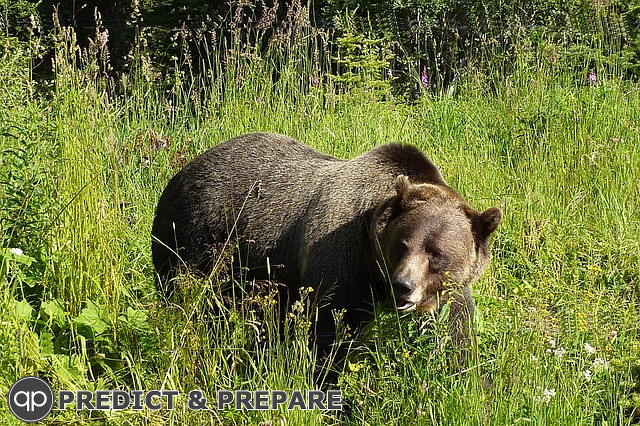Bears have been depicted in several movies as predators that target humans, but in actual fact the majority of bear encounters rarely involve any aggression, let alone an attack. However, if you are in bear country when camping, hiking or even live there, you need to be prepared and learn how to react or better yet, prevent a bear encounter all together.
When camping, keep your campsite clean and avoid attracting bears with garbage or food, never intentionally (or unintentionally) feed a bear. Bears have a very keen sense of smell and can even be attracted to soaps, deodorant, cosmetics and bug repellents (especially ones that contain citronella). Use odour proof barrier bags and bear resistant containers to store items which bears may be attracted to (there are many different models/options available). If you don’t want to invest in containers you can also hang your food out of reach between two trees using a cord (called a bear hang or bear bag). Another option to consider is securing your campsite with portable electric fence as it is lightweight and highly effective.
When you’re out hiking you should always carry a deterrent like bear spray. Be aware of your surroundings and on the lookout for evidence of bears (tracks, excrement, trampled vegetation). If you come upon an animal carcass, keep your distance. Bears usually avoid people and don’t go looking for trouble but most attacks are a result of bears defending their food or protecting their young. There is no record of a bear attacking a large group so if possible go hiking with at least a few other people in daylight hours and talk loudly, make as much noise as possible to avoid a surprise encounter. If you’re hiking with a dog it is best to keep it leashed and under control. Dogs are excellent for detecting bears but if they are running loose, they can escalate the situation by confronting and agitating a bear, which is very dangerous for you and your dog.
If you have done everything possible to avoid an encounter but you still manage to cross paths with a bear there are a few things you can do. First, remain calm and keep your distance, quickly analyze the situation to see if there are cubs or a carcass nearby. Have your bear spray ready and back away slowly, preferably the way you came but if that’s not possible then make a wide detour. Keep an eye on the bear at all times to see how it is reacting, in most cases it won’t bother you at all and will take off. If a bear comes into your campsite and you are confident it is a black bear you can usually scare it off just by yelling while looking it in the eye and standing tall. This wouldn’t necessarily be the most recommended approach but can be an effective one if it’s a black bear, never try this with a Grizzly!
If you come upon a defensive bear and it’s impossible to get away then immediately go for your bear spray. You want to spray the bears head, mainly its eyes, nose and throat. Give it a good blast when the bear is approx 20 to 30 feet away, this should send the bear in the opposite direction. Finally, if you have the ultimate misfortune of coming face to face with a mother bear (most likely a Grizzly) that is protecting her cubs and she attacks, fall to the ground, on your stomach and play dead. Cover your head and the back of your neck with your hands, try to keep your legs out so it’s difficult for her to roll you over. If the attack is prolonged and you fear you could be eaten then it’s time to fight back! Concentrate on the face, eyes and nose by hitting, kicking or using any weapon that is handy. When the attack is over remain still until you are certain the bear has left the area, even if it takes 30 minutes or more.
Although the likelihood of actually being attacked by a bear is very slim, encountering one while camping or hiking is very possible. So be prepared and stay safe by remembering these simple guidelines the next time you are in bear territory.
